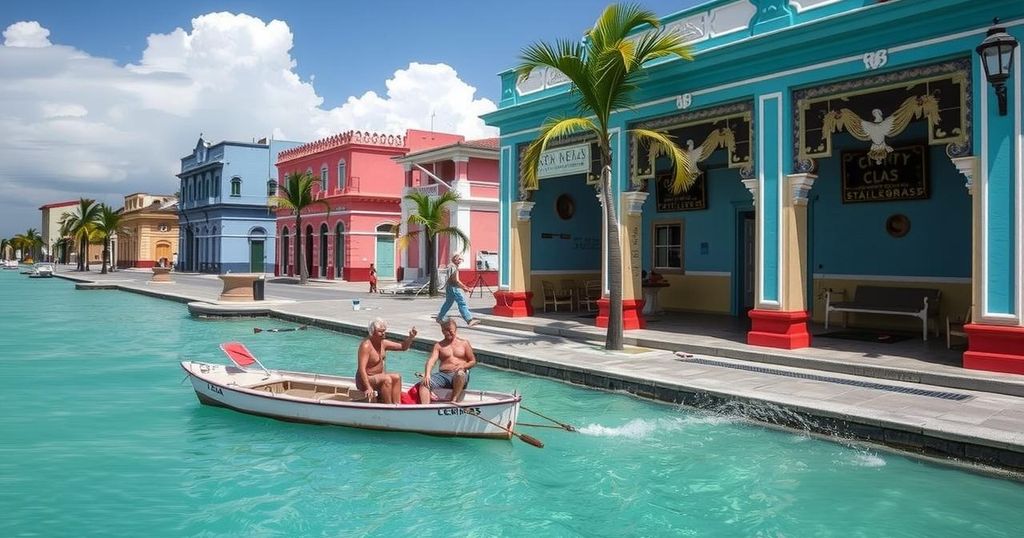Cuba’s tourism sector faces turmoil due to recent nationwide blackouts and the removal of 26 hotels from Sunwings’ portfolio, as Canadian visitors look for alternatives amid fears of instability. Changing U.S. policies under Trump’s administration could exacerbate challenges. These developments highlight Cuba’s critical need to improve energy infrastructure to maintain its attractiveness as a travel destination.
As Canadian winter travelers plan their seasonal escapes to warmer destinations, Cuba, a longtime favorite among tourists, faces significant challenges due to nationwide blackouts and shifting political dynamics. The Canadian travel operator Sunwings Vacations Group recently removed 26 hotels from its offerings in Cuba, citing concerns over the country’s compromised power infrastructure following several prolonged outages. This decision underscores the growing trepidation among travelers regarding Cuba’s reliability as a tourist destination.
In 2022, nearly one million Canadians visited Cuba, the highest number from any single country, due to the restrictions faced by American tourists under the ongoing U.S. embargo. However, following power failures exacerbated by Hurricane Rafael and a major breakdown at the country’s largest power plant, Sunwings opted to present clients with alternative vacation options in the Dominican Republic, the Bahamas, and Colombia, thereby diverting potential tourists away from Cuba.
Lessner Gómez, director of the Cuban Tourism Board in Toronto, emphasized the importance of the tourism sector to Cuba’s economy, pledging improvements to services and airport experiences in preparation for the winter season. Despite these affirmations, the long-standing challenges of frequent power outages and consequent instability in tourism have created a precarious situation for the island’s economy, primarily reliant on foreign tourism.
Moreover, the political climate under President Donald Trump poses further risks. His administration’s tough stance on Cuba, coupled with anticipated leadership from figures like Senator Marco Rubio, may lead to stricter sanctions and potentially halt commercial flights to the island. Such measures could create additional barriers for tourists and further cripple the already ailing tourism sector, which has seen numbers significantly plummet since the peak during the Obama administration.
Despite the struggles, Cuba’s unique charm, characterized by its rich culture, historic heritage, and inviting landscapes, continues to attract visitors. However, the prevailing energy crisis and uncertainty concerning future U.S. relations with Cuba are significant deterrents for potential travelers, especially in light of Sunwings’ decision to scale back its offerings. While the allure of Cuba remains evident, the issues at hand beckon a pressing need for reforms and strategic focus on energy infrastructure that could sustain and revitalize the tourism sector.
Cuba has long been a popular destination for Canadian tourists, who seek alternatives to the U.S. embargoed travel market. With tourism acting as a critical component of the Cuban economy, particularly in generating foreign currency, recent disruptions due to extensive blackouts and natural disasters have stirred concerns among travel operators and potential tourists. As Canada gears up for winter travel to Cuba, the recent actions by Sunwings highlight the fragility of the islands’ tourism amid a backdrop of deteriorating infrastructure and forthcoming political uncertainties with the expected return of strict U.S. policies under President Trump.
The ongoing energy crises in Cuba present serious challenges to its economic stability, particularly concerning its tourism sector, which has not fully recovered since the easing of restrictions in previous years. Sunwings’ decision to reduce its Cuban offerings serves as a warning that without immediate improvements in infrastructure and energy resilience, Cuba risks losing its appeal as a premier travel destination amidst increasing competition and external political pressures. The need for strategic investment in energy infrastructure is paramount for reviving and sustaining this vital economic sector.
Original Source: www.bbc.com







